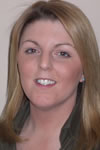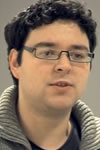Ask me a question!
What were the main 'career decision' milestones in your life so far?
- Choosing to study engineering. Aptitude tests completed in secondary school helped me realise that I had an aptitude for engineering. Also with other members of my family in the same professions it seemed a simple decision.
-Gaining an ICT placement. Being given an opportunity to work for 11 months with Intel led to me obtaining a full time permanent position with them and I have now worked for Intel for almost 4 years.
-Trying different job roles. I had the opportunity to change job roles in Intel and this I believe increased my knowledge/understanding to enable me develop a better understanding of the manufacturing process.
Who are the people who most influenced your career direction?
How did you go about getting your current job?
After some time off directly after college, I applied for an ICT Graduate placement. ICT Ireland provides graduates with the opportunity for placements with participating companies. I was successful in getting an 11 month placement in Intel, in the Unit Level Failure Analysis group.
After the 11 month placement I was offered a full time position within the same group. After working for approximately 1 year in that role I changed job role to work with the Yield Analysis group.
Describe a typical day?
Each engineer in the Yield Analysis group is assigned a product for which he/she is responsible. Day-to-day work involves monitoring end of line yields and if/when there are any yield depressions performing analytical functions to try to understand what may be the problem.
A typical day usually involves meeting with the other members of the group to discuss issues and meeting other engineers in the Fab to try to resolve those problems. Most days throw up different problems and issues and thus each day is usually slightly different from the last!
What are the main tasks and responsibilities?
What are the main challenges?
As every day is slightly different and you can be dealing with process engineers from different sections of the Fab every day, the main challenge I have is trying to gain an understanding of each section. Each day you tend to gain more knowledge of the Fab process and with every little piece of knowledge you gain your understanding becomes that bit greater.
What do you like most?
What particular skills do you bring to your workplace?
What subjects did you take in school and how have these influenced your career path?
After completing my Junior Certificate I tried to choose a range of subjects in order to maintain options for Leaving Cert/College, and so studied Physics, Accountancy and Home Economics. I believed maintaining at least 1 science subject was important as it can be a requisite for many college courses. Physics was also then key in my choice of Engineering at third level. Accountancy and Home Economics were subjects I enjoyed and performed quite well at but could not see myself developing a career in. Physics was a good basis for continuing on to study Electronic Engineering in college. Although having studied any science subject at Leaving Certificate level is required for entry to engineering I believe that Physics was the most relevant for my course.
What is your education to date?
What aspects of your education have proven most important for your job?
My 4 years studying all aspects of electronic engineering has provided a good basis for my current job. This course starts from studying the fundamentals of electrical/mechanical engineering to covering more in-depth and varied subjects such as digital signal processing, object orientated programming, semiconductors and industrial engineering. Working in Intel, a semiconductor manufacturer, numerous subjects from the basics, to circuit and systems to semiconductor devices have helped with my present job.
What have been the most rewarding events in your career so far?
One of the most rewarding events was being offered a permanent position after completing my 11 month placement. Being offered this position validated that I had being doing a good job during the placement. Also during my time at Intel I have received awards for the work I have done, it is always satisfying to receive commendation for the work you have done.
What personal qualities do you have that helps you in your career?
Does your job allow you to have a lifestyle you are happy with?
What advice would you give to someone considering this job?
For my particular job role, as a yield analysis engineer, good organization and communication skills are quite important. Along with having the technical knowledge, being able to properly communicate your ideas/findings is very important. A lot of my day is spent dealing with other people in the factory and it is very important to be able to communicate efficiently with them.
What are the three most important personal characteristics required for the job?
Good communication - My job involves working every day with engineers in all roles in the factory. You need to be able to communicate the results/findings you have to achieve the desired results. Everyone needs to work together and communicate well in order to solve problems.
Time management - As I receive numerous work requests in a day/week, I need to be able to prioritize my work accordingly and plan my time in each day to ensure that I get all my work completed.
Flexibility - Each day can bring different challenges, as I work within a team we need to be flexible to ensure that the groups work gets completed along with each individuals.
Have you undertaken, or do you plan to undertake any further training as part of your job?
What kinds of work experience would provide a good background for this position?
As a part of my course in DCU we were provided with a 6 month work experience opportunity. While the company I worked for in that time was not related to semiconductors, it was worthwhile to work in a manufacturing company as the principles of engineering work in both are quite similar although they manufacture quite different products.
- Career Development?
- Current Job?
- Education and Training?
- Personal Qualities?
- Advice for Others?








